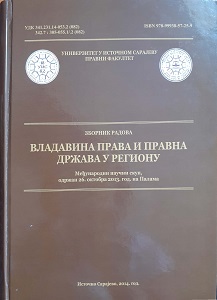Правна држава према Земаљском уставу (Штатуту)
Rule of Law in the Provincial Constitution (Statute) for Bosnia and Herzegovina
Author(s): Sanja Savić
Subject(s): Constitutional Law, 19th Century
Published by: Правни факултет Универзитета у Источном Сарајеву
Keywords: Provincial constitution (Statute);Bosnia and Herzegovina;Austria-Hungary;Civil rights and freedoms;Parliament;
Summary/Abstract: During the second half of the nineteenth century Bosnia and Herzegovina went through many turbulent events. Finding itself in the sphere of interest of the Austro-Hungarian Monarchy it was originally occupied and then annexed by this power. Knowing that the annexation violated the pro-visions of the Berlin Treaty, Monarchy tried to justify this act with the need for enacting constitution for these provinces. Although it was promised during the annexation, two years passed before the Constitution of Bosnia and Herzegovina was actually adopted– in February 17, 1910. Together with the Constitution five organic laws were enacted: Electoral Law, Law on Parliamentary Procedure, Law on Associations, Law on Rallying and Law on Chambers of Districts. Therefore, the newly established constitutional order of Bosnia and Herzegovina was regulated by six legal acts. The Provincial Constitution of Bosnia and Herzegovina consists of a preamble and normative part. Within the normative part the contents are classified into three distinct parts, the first devoted to civil rights and the other two to the Parliament. Parliament consisted of two types of members: Members of Parliament elected by the people and members nominated according to their function or social position. Selection of members was carried out by complicated confessional-curial system. Jurisdiction of the Parliament was strongly limited for it could not interfere in issues which are of concern of Austria, Hungary or the whole of Monarchy. At the same time, the Parliament could not question colonial status of Bosnia and Herzegovina. On the other hand, issues within the jurisdiction of the Parliament could not be solved without consent of the authorities of Monarchy. Despite numerous shortcomings, the Provincial Constitution was a step forward in comparison to previously existing Austro-Hungarian absolutist regime.
- Page Range: 817-829
- Page Count: 13
- Publication Year: 2013
- Language: Serbian
- Content File-PDF

